Companies House business plan 2020 to 2021
Published 29 September 2020
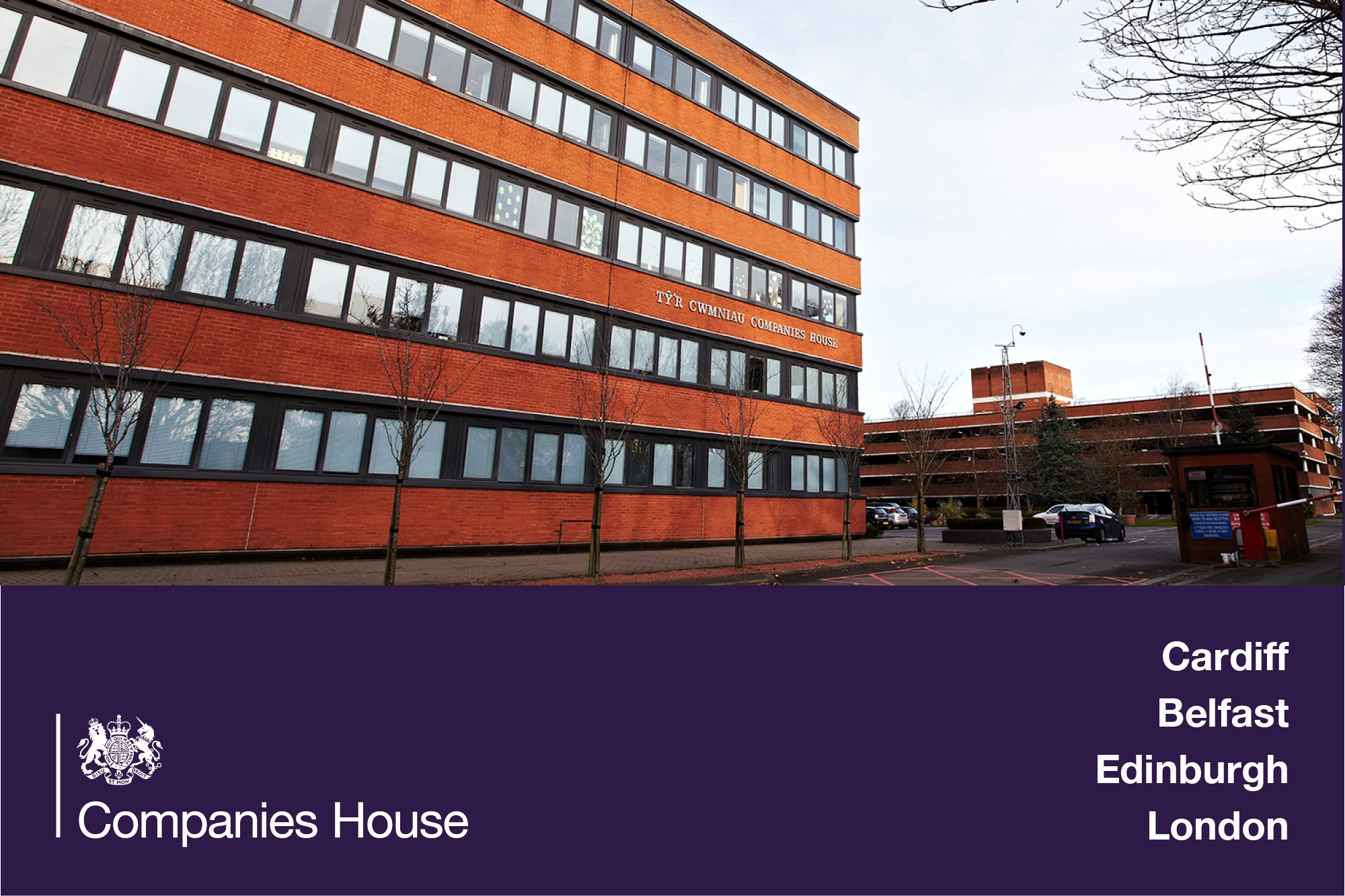
Chair and Chief Executive’s foreword
We are pleased to introduce the Companies House Business Plan for 2020 to 2021. We apologise that publication is much later than originally planned, due to a number of factors including the coronavirus (COVID-19) pandemic. However, the key activities, targets and financial forecasts set out remain in line with those originally envisaged as we pursue our corporate targets, strategic objectives and organisational transformation.
Last year we embarked on an ambitious programme of transformation and legislative change. Together these will provide the platform for supporting the prevention of economic crime, whilst continuing to support business by providing services that make it easy for companies to comply and to access the information they need.
The government has recently set out the future for Companies House in its response following consultation on Corporate Transparency and Register Reform. Proposed reforms will enhance powers to query information, increase checks to verify identity, and introduce measures to improve the exchange of intelligence between Companies House and UK Law Enforcement bodies.
We look forward to working together to seek to deliver on our purpose of driving confidence in the UK economy, progressing the broad packages of reform that will make registers more effective, and the programme of activity that will enable Companies House to become a high performing digital organisation.
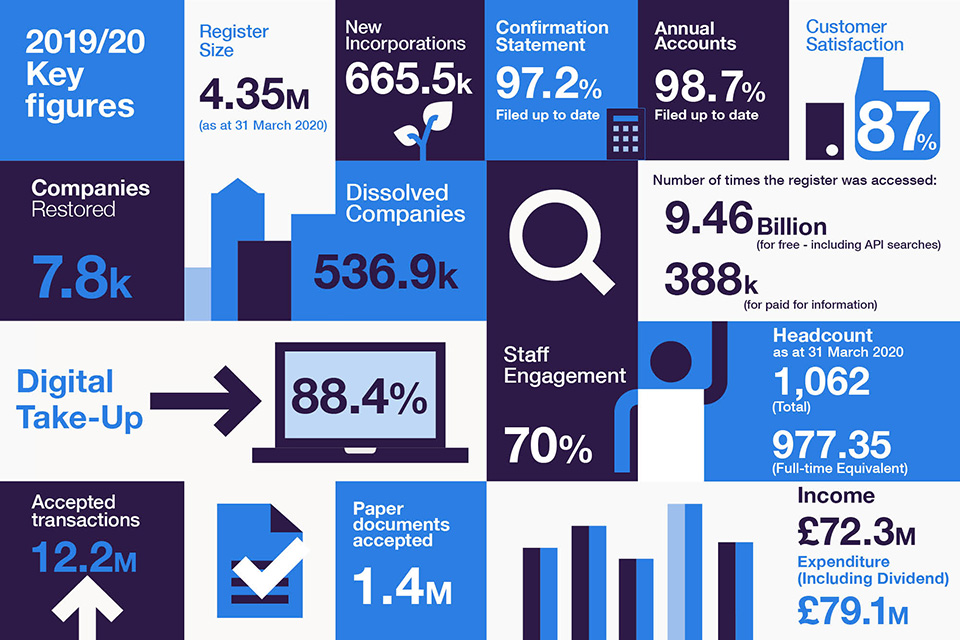
Key figures from the Companies House annual report 2019 to 2020.
1. Introduction
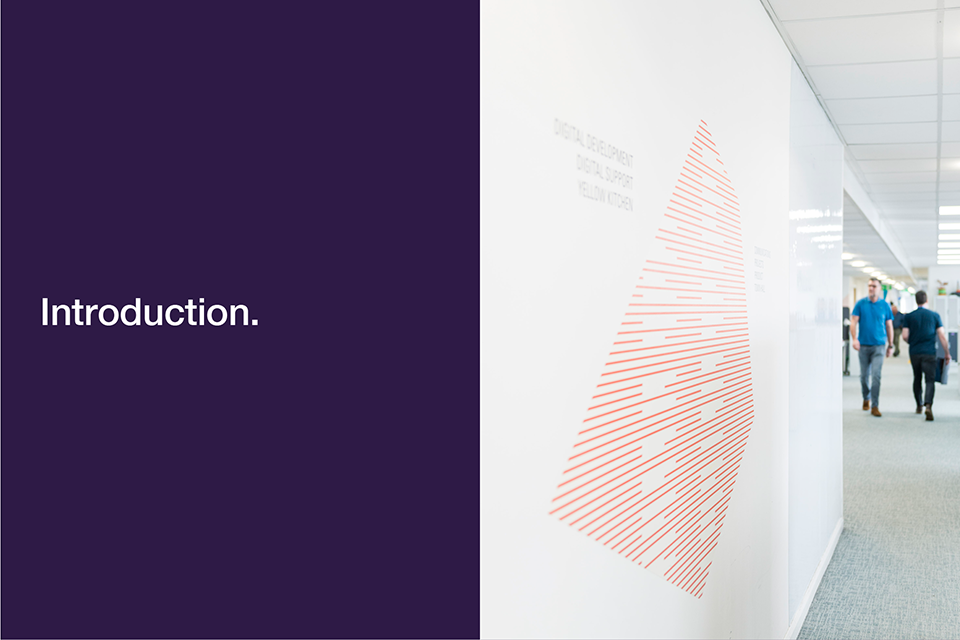
Companies House plays a pivotal role in providing the environment to make the UK a great place to do business. Over the last year we have further enhanced the transparency of our registers and continued to drive high customer satisfaction. This has in recent months included making wide ranging changes to services and procedures to respond swiftly and flexibly to the needs of business during the COVID-19 epidemic. We will build upon these achievements this year as we continue with our wide ranging organisational transformation.
The government has recently published its response to the consultation on Corporate Transparency and Register Reform. This gives us a unique opportunity to implement our ambitious plans to transform the value our registers add to the UK economy, and signals the start of a new era for Companies House.
We already know the work we undertake facilitates millions of business decisions every day, and that the services we provide can make a substantial contribution to supporting business and making it easy to do business in the UK. Register reforms will provide a platform to enhance our role across government, to be more than simply a register. They, combined with transformation of our systems, services and people, will add ways in which we can support business growth and transactions, driving compliant behaviour through improved digital services that provide increased transparency. Both will also facilitate enhanced exchange of intelligence to help support the fight against economic crime.
Alongside this year’s Business Plan we are also publishing our Strategy for 2020 to 2025. This sets out our purpose ‘to drive confidence in the UK economy’ and our vision ‘To be the most innovative, open and trusted registry in the world - with brilliant services delivered by brilliant people’. Our strategy will guide our activities over the next 5 years, building on previous achievements to implement further changes that drive confidence in our register and maximise the value that we add. We will develop further brilliant systems, and provide opportunities for our brilliant people to flourish and develop skills in new and fulfilling roles.
This year holds a range of challenges. Some, like the continued need to respond to the COVID-19 crisis, will impact on the plans we had made and continue to test our responsiveness and flexibility as we and companies move to a new normal. One of our biggest anticipated challenges is our changed status: from 2020, we ceased to be a trading fund, which means managing our finances in a different way. This challenge brings with it an opportunity to ensure all our activities build on robust governance processes to deliver efficient customer services to our customers and support our strategic goals.
We are ready for all of the challenges ahead. Whilst some of the changes we make will need the backing of legislation, others are already within our grasp. To turn this vision into reality, this year will see the further deliveries in our organisational transformation programme, and lay the foundations for legislative reforms. We will ensure that we integrate positive changes to our services, culture and way of working stemming from our response to COVID-19 to give us a firm foundation to build on. Together, these activities are the start of our journey to becoming a brilliant transformed organisation.
2. Our corporate targets
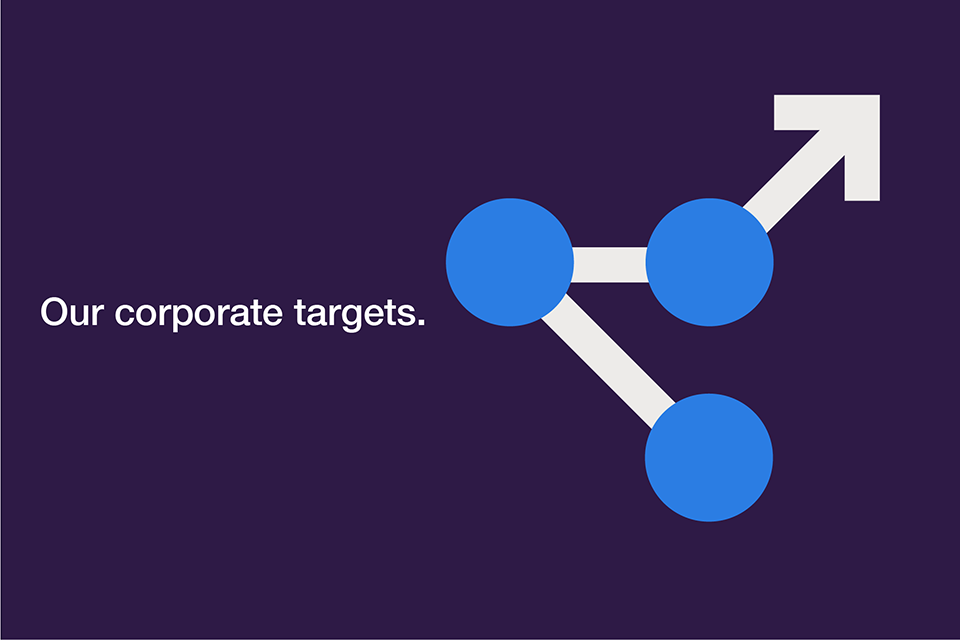
Our corporate targets for the year April 2020 to March 2021 are set out below. Some of them will ensure that we maintain the high standards we have reached, whilst others represent the first steps on a journey towards achieving our new strategic goals.
Customer Satisfaction
We will be in the top quartile of public service organisations for customer satisfaction.
It is vital for us to understand customer satisfaction, to achieve good rates for our services and respond to feedback to continuously improve our services. We will continue to collect data to measure customer satisfaction across a range of services to derive an overall score, utilising audited techniques to maximise the range of feedback we receive. We will compare our score with that achieved by other service organisations according to the UK Customer Satisfaction Index.
Digital Service Availability
Digital services will be available for a minimum of 99.9% of the time.
Our digital services are essential for our customers to be able to comply with their statutory obligations, to communicate with us, and to interrogate register data. We will retain our availability target at a minimum of 99.9% to ensure that vital services remain highly available.
Compliance
97% of companies on the register will have an up-to-date confirmation statement.
Maintaining high levels of compliance is essential to ensuring that our register is populated with up to date data. Completing a confirmation statement means a customer checking that the information we hold about their company is correct and fully up to date.
Financial performance
We will manage expenditure set out within budgetary limits.
In April 2020 Companies House changed status from a public corporation (trading fund) to a central government body. Given this change and revised ways of working, we have developed a new measure to drive efficiency and effectiveness through good management of our budget.
Diversity
We will maintain the proportion of external applications from underrepresented groups.
The diversity of our workforce is an important factor in widening organisational talent and better understanding the needs of our customers. We aim to maintain the increased level of applications from underrepresented groups achieved last year by continuing to build on our recruitment and attraction strategies to address perceived inequalities in the recruitment process.
Environment
We will withdraw the paper channel for reminders by the end of March 2021.
We aspire to become a fully digital organisation with all the customer, environmental and efficiency benefits that can deliver. Withdrawing paper reminders (whilst retaining and promoting the digital reminder service) will in future eliminate around 4 million items of outgoing mail per year and save over 150 tonnes of carbon emissions.
3. Our role
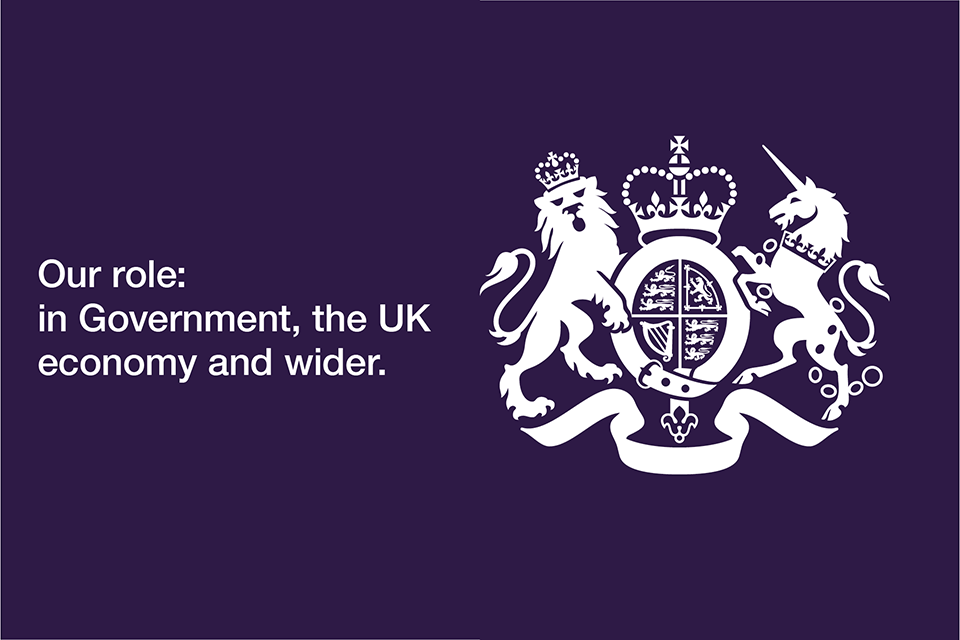
Companies House has a vital role to play in the UK economy, supporting entrepreneurship, business start-up and business growth. Our services help millions of businesses to fulfil their statutory obligations for providing information which we then make publicly and freely available to help inform millions of business decisions. That same information supports a range of law enforcement activity and gives us the potential to play an increasingly important role in combatting economic crime.
During the last year we have continued to work with colleagues in the Department for Business, Energy and Industrial Strategy (BEIS) and other areas of government to understand how we can better fulfil our role and to plan the measures and activities that will make this a reality. We look forward to continuing and enhancing these relationships, working with colleagues across government, with law enforcement and in other areas to further our complimentary agendas in the interests of those users and stakeholders we hold in common.
Companies House continues to be well regarded internationally. We have close ties with company registries across the world, with whom we are able to share expertise and experience. We are frequently asked to host visits from other registries so that they can learn from us, and we also attend and present at various conferences, which allows us to meet representatives from interested international organisations such as the World Bank. We can also learn from others and as we transform our organisation and pursue legislative reform we will use our network of international contacts for inspiration and to inform our activities. At the current time of course face to face gatherings and visits are not possible. We are maintaining digital contact with colleagues in other registries and looking for innovative ways to engage with them and stakeholders in the coming months.
Our purpose ‘Driving confidence in the UK economy’ reflects the role we have to play, and we recognise both the opportunities and challenges this presents. A high standard of corporate governance in relation to the benefits of limited liability is a key element of the UK business environment and, whilst those standards are acknowledged both in the UK and internationally, concern has grown that UK corporate vehicles are too open to misuse.
Whilst we must tackle this issue, we must also ensure that in doing so we minimise the burden imposed on business and continue to build services that are simple, easy to use and deliver the right outcomes for our users and for us. One of the ways in which we can do this is to seek out ways to work with other parts of government to simplify regimes and services so that we continue to improve the status of the UK as a great place to do business. In doing this we are aware of the range of factors that contribute to ease of doing business and conscious of the contribution we can make to, for instance, improving the ease and speed of starting a business for legitimate use whilst detecting and deterring misuse. By making our information available to the public and using it better ourselves we can improve identification of suspicious activities that reveal the small proportion of companies being misused.
The combination of these factors points to a significant shift in our role. Our new strategy for 2020 to 2025 focuses on that new role, and sets out 6 strategic goals and the things that we will do in future to enhance and build on it.
Our goals are:
- Our registers and data inspire trust and confidence
- We maximise the value of our registers to the UK economy
- We combat economic crime through active use of analysis and intelligence
- Our brilliant services give a great user experience
- Our culture enables our brilliant people to flourish and drives high performance
- We deliver value through efficient use of resources
Achieving our strategic goals will require a combination of organisational and legislative transformation, and we see these two as inextricably linked. Our strategy covers a 5 year period and some of the things we want to do will require the backing of future legislation, but there are areas where we can initiate and progress activity now. Our overall direction is reform and transformation: this year, building on the public consultation on Corporate Transparency and Register Reform undertaken in 2019, we will prepare for anticipated legislative reforms at the same time as continuing to transform our services, our people, and how we organise ourselves. These are the activities that are laid out in this plan.
4. Our register

Three of our strategic goals for 2020 to 2025 relate directly to our register and how it is used. These are:
- Our register and data inspire trust and confidence
- We maximise the value of the register to the UK economy
- We combat economic crime through active use of analysis and intelligence
These set out our direction and ambition over the next 5 years for our register and the use to which it is put. In the 2020 to 2021 business year, as we embark on the first year of our journey to deliver against these goals we will complete delivery on some activities and lay the foundations for others.
Enhancing services to enable compliance with the Fifth Money Laundering Directive
In January 2020 we put in place a reporting tool to meet the legislative requirement of the Fifth Money Laundering Directive, enabling users to report discrepancies relating to people with significant control (PSCs).
This year we will assess the success of that tool. We will enhance the initial offering to develop a service led by customer insight that makes reporting easier, more accessible and more intuitive with fewer data input requirements. At the same time, the processing impact of reports will be reduced and more data on discrepancies will be available within Companies House and to government. We will also continue to investigate opportunities for collaboration across government in the area.
Feedback loops and data matching
Much of the work that will be done in this area is preparatory activity in anticipation of legislative change which will enable us to make wider use of our thinking and the facilities we develop.
This year we will review data matching opportunities across government and law enforcement to ensure that we have fully identified reporting gateways and are utilising these to the maximum effect allowed within the current legal framework. We will also review existing processes for reporting and providing feedback in the field of criminal activity, including Suspicious Activity Reporting processes.
At the same time we will identify the current gaps in legislation that restrict activity so that we can ensure these are captured as candidates for future legislative reform.
Identity and Access Management
Modern Identity and Access Management (IDAM) capabilities will underpin many of the changes we want to make in the future. From a secure account for users to data protection and management, we anticipate it providing the foundation for a range of future services. Some of these such as identity verification of company officers will require legislative change and we will wait until we understand the shape of legislation before progressing beyond proof of concept. We will however be able to progress others, such as developing a new Companies House Account approach.
We must ensure that we properly understand and articulate our requirements as we engage with potential suppliers. That engagement and the procurement exercise has already started and we look forward to service development starting when that is completed and delivering in subsequent years as required by service enhancements and enabled by legislation.
Preparing for legislation
In its 2019 consultation on Corporate Transparency and Register Reform, the Department for Business, Energy and Industrial Strategy (BEIS) set out the government’s vision for the future of the companies register. The consultation proposed a register built on relevant and accurate information, supporting the UK’s global reputation as a trusted and welcoming place to do business and a leading exponent of greater corporate transparency. At the same time, it recognised the potential for Companies House to deliver an even stronger contribution to economic growth, whilst strengthening the UK’s ability to tackle economic crime. Measures were proposed in that consultation to strengthen the role of Companies House and the registrar, including plans to verify identities, validate more information and introduce gateways to share and match data with other public and private sector bodies.
We have been working closely with BEIS on this and other measures aimed at enhancing corporate transparency and combatting money laundering, including the Register of Overseas Entities Beneficial Ownership. This close collaboration with BEIS and other key departments will continue during the rest of the year, as we work together to determine how to take forward these changes. We want to ensure that this legislative change is translated into new systems and processes that work for our customers, as well as effectively delivering the government’s vision for the new role of Companies House in the economy, and in the fight against economic crime.
Now that the government response to the consultation has been published, we will be able to build even stronger relationships with BEIS and other key stakeholders as we plan for and implement these major changes. We will be working together to develop detailed proposals for the areas of reform the government intends to take forward.
The government response gives a commitment to consult further on both powers and accounts. We will therefore consult further on how new powers will look and provide more detail on the circumstances under which they might be triggered. Checks on filings will be delivered through new Companies House systems and will be based on risk assessments informed by law enforcement, government partners and civil society. There was strong support for reform in the area of accounts area and numerous practical suggestions received. As a result, we are now considering reforms that go further than initially envisaged, and will consult again on more detailed proposals.
Our work with other departments and agencies, private and third sector bodies and industry experts will also continue, including building on our already strong relationships with the law enforcement community. Together we will design new systems and processes to support this legislative change that work for our customers and deliver the government’s vision.
5. Our customers and services

Our register underpins the services we provide to our customers, whether they are providing information or searching for it. In the next year we will continue to develop our services to ensure that:
Our brilliant services give a great user experience.
Developing and enhancing services for customers
In this first year of our strategy we will continue to develop and enhance our digital services:
Redesigning existing digital filing services and developing new ones
This year we will start to redevelop our digital filing services, ensuring we put user needs first and develop services that are accessible and easy to use. We will improve the user experience of existing high volume web transactions, developing on new technology and our agreed platform. At the same time we will learn lessons from the services that we have put in place to respond to the COVID-19 crisis, ensuring that we don’t lose but instead build on the positive developments undertaken.
Our first development will be a simplified online journey for checking company data and submitting a confirmation statement where there have been no changes to that data. This will lay the building blocks for more complex services. We will also begin to create brand new digital services for higher volume transactions such as those relating to insolvency which are currently paper-only or the subject of interim services introduced in response to COVID-19.
Redesigning existing digital transactions, including providing more intuitive services for confirmation statement and other filings, will improve customer satisfaction and help to make our register more accurate and up-to-date. In the future it will be easier and quicker to improve services based on new technology and creating digital services for transactions that are currently paper only will make services more efficient, reduce risk and meet customer expectations.
Accounts services
In 2018 regulations introduced new mandatory energy and carbon reporting requirements for large and quoted companies. This applies to accounts commencing on or after April 2019. We have developed services to accept filings, enabling companies and Limited Liability Partnerships to meet their legal obligations and this important environmental information to be recorded on the register. Although in practice we expect to start seeing accounts containing this information later in the year, they could be filed from April 2020. We have therefore enabled filing now so that companies that wish to can use it voluntarily report early, allowing their environmental information to be recorded and made available on the public record.
The EU Transparency Directive has been amended to require consolidated accounts prepared by listed companies in the EU, to use the European Single Electronic Format (XHTML format with iXBRL tagging, using the ESEF taxonomy) for reporting years beginning on or after 1 January 2020. Companies listed in the UK, when filing consolidated accounts with the Financial Conduct Authority can use the UK Single Electronic Format. (XHTML format with iXBRL tagging, using the UKSEF taxonomy). Whilst there is no legal obligation for companies to file in this format with Companies House, they may wish to file the same accounts with Companies House that they file with their parent country. We are therefore preparing our systems to accept filings in this format for reporting years ending in January 2021, and are engaging with other government departments at regular cross Whitehall ESEF meetings.
Decommissioning the WebCHeck and CH Direct services
Our legacy WebCHeck and CH Direct services have performed well for us, providing millions of customers with company data, but technology has moved on significantly since they were developed, and they are reaching end of life. Our Companies House Service (CHS) has for some years provided the bulk of the functionality that the legacy services also provide, and has been the service of choice for the majority of customers for company information.
There are however some gaps to be filled to ensure there is sufficient functionality on CHS to allow the older services to be retired, in the first half of the year we plan to develop the additional functionality needed for CHS to fulfil remaining user needs. We have already delivered a company snapshot that allows users to easily download all the information for a company in one go and are actively encouraging migration to this new product. We have also implemented an alphabetic search service and the ability to order certificates on the new platform. It remains for us to complement this with the ability to order certified copies as well as images to be scanned on demand. Remaining functionality is targeted for September 2020, allowing us to provide a suite of fully accessible services in line with user and legislative requirements.
We have been reviewing which records should be made available for dissolved companies for some time, leading to an interim decision to show only 6 years’ dissolved records on CHS until a final decision was reached. Our legacy services currently hold more information and are the route to dissolved records for many customers.
This question featured in the consultation on Corporate Transparency and Register Reform. In line with the outcomes of the consultation, ultimately we will freely provide 20 years of dissolved company records on CHS. We will do this once the law is changed to allow for the protection of personal data. In the interim, we will be adding nearly 5 years of dissolved records (any since 2010) to CHS and are currently investigating routes to ensure that during this period our customers continue to have access to dissolved records for up to 20 years through other products (for which a fee is likely to be payable).
Capturing data and generating images on demand - making filing data more accessible
Having information provided to us in data format makes it more efficient for us to process and offers more potential to consumers of that data to process it, combine it with other data sets and derive value from it. An example of where we ourselves can improve functionality and accessibility is by giving access to data rather than pdf or image files. In some cases we will be able to do that because we already hold the underlying data.
Currently we store information from filings in digital format as items of data but also convert that data to image format and store it so that it can be made available in a way analogous to providing an image of a paper filing. Analysable data is converted to a static image which cannot easily be machine analysed or interpreted. This approach is inefficient in terms of both processing and storage and does not fit our being a digital organisation. We also anticipate future legislation requiring an ability to redact data elements. Something that cannot be easily achieved with images rather than data.
This year we will start work to create a base mechanism and building blocks for capturing all the data from a filing that would be required to generate an image on demand only. That is, we will routinely store only data and not the image. However, we will generate an image from it where the user prefers to see data presented in this format rather than consume raw data or individual data items. This approach will be introduced in phases according to technical and policy considerations which will extend beyond the current year’s initial developments.
Improving customer service
Better customer service is vital to our delivering on our strategic goal of providing brilliant services. Our changing culture is prioritising professionalisation and improving skills in our teams so that they can in turn improve services to customers.
Improving staff skills
Our customer facing teams will work closely with colleagues in the Operational Delivery Profession. This is the largest profession in government and covers most of the staff working at Companies House delivering services to our customers. We are working with the profession to improve the learning and development of skills needed now, and in the future as we continue our organisational transformation.
We will continue to use the Institute of Customer Services Qualifications programme to improve and recognise the customer service we deliver to our customers. A number of colleagues have achieved qualifications and we will roll this out to more this year.
Improving services to customers
We will use customer feedback from our Contact Centre and customer service teams, satisfaction survey and complaints data as well as our user research panel to gain a better understanding of our customers’ needs so we can focus on the services we need to improve to deliver a brilliant service to customers. This will provide vital input for Service Owners as we change our organisational structure and move to a service model based around 3 services: Filing, Get Company Information, and Intelligence and Enforcement.
We have been trialling a quality framework in some of our customer facing teams to improve our customer service standards and in particular how we deal with customers who contact us by phone or email. Because of the pressures of the COVID-19 crisis this work was paused and temporary service level agreements put in place. Having successfully completed the trial, plans for roll out to all customer teams will be re-instated in coming months.
We encourage our customers to use our digital services to file statutory documents with us as they are simpler and easier to use, have significant environmental benefits, and provide customers with a quicker response. We have made significant improvements in speeding up processing, including to those digital transactions that need human intervention and to emails and other correspondence. We will continue our efforts to ensure that all customers’ processing is carried out as swiftly as possible.
To improve the service we give to those customers who call us using the Welsh language we are looking to introduce a specialised customer service team. They will provide a dedicated service to our Welsh speaking customers in line with our Welsh Language Scheme.
Changing and enhancing technology to support customers
Changes to our services are not limited to development of digital services or to those that are visible to the user. We have a number of changes planned that will improve how we and our customers communicate or ensure that the technology underlying our digital services remains fit for purpose:
Customer contact: voice recognition, webchat and chatbots
Last year we started to introduce new digital options for customers using our contact centre. Using voice recognition we are able to send messages by SMS to customers using a mobile phone enquiring about starting and dissolving a company. This gives them a quicker response to their enquiry and directs them towards the use of our most effective and efficient services – those available digitally. We are also able to deliver messages about relevant digital services to customers calling on a landline or who do not act on the SMS message.
We plan to widen this service to more types of customer calls. We are also going to investigate the use of Artificial Intelligence to improve the customer experience, provide choice in how they contact us and speeding up responses to customers. This will include trialling the use of webchat and / or chatbots.
Communicating with stakeholders and customers
Throughout the remainder of the year we will be communicating our changing role to stakeholders and customers, including promoting our new strategy. We will find new ways to work in partnership and will launch our first stakeholder survey to seek feedback on how we’re doing and what we still need to do. We will also investigate the potential for alternative channels such as text reminders for annual filings as we remove the paper reminder process.
At the same time, we will begin a significant programme of improving our guidance, including creating guidance in the formats our customers prefer, utilising video and other tools. Later in the year we will run campaigns to encourage online filing and to help our customers, especially first-time directors, understand their responsibilities. We will emphasise that filing responsibilities belong to directors, not accountants or other intermediaries, and use advocates to talk about the different types of corporate vehicle available.
Changes to underlying technology
We will also be making changes to underlying technologies that support our services so that we can keep them up to date and eliminate risk.
Our new network strategy will change how we connect to and operate over the internet, futureproofing our multiple points of entry requirement in the future. It will also improve security and speed of connection when working flexibly or in our offices outside of Cardiff. We will start to deliver on this strategy in 2020.
As we work towards decommissioning our legacy services, we will move those services that remain to cloud. This is in line with our strategy of cloud first and by default for everything, moving away from investing in the Companies House site for hosting services. We are planning to migrate legacy services this year and expect this to realise multiple benefits. Some of these include improved availability and disaster recovery capability, and reductions in carbon footprint.
6. Our people and the way we work
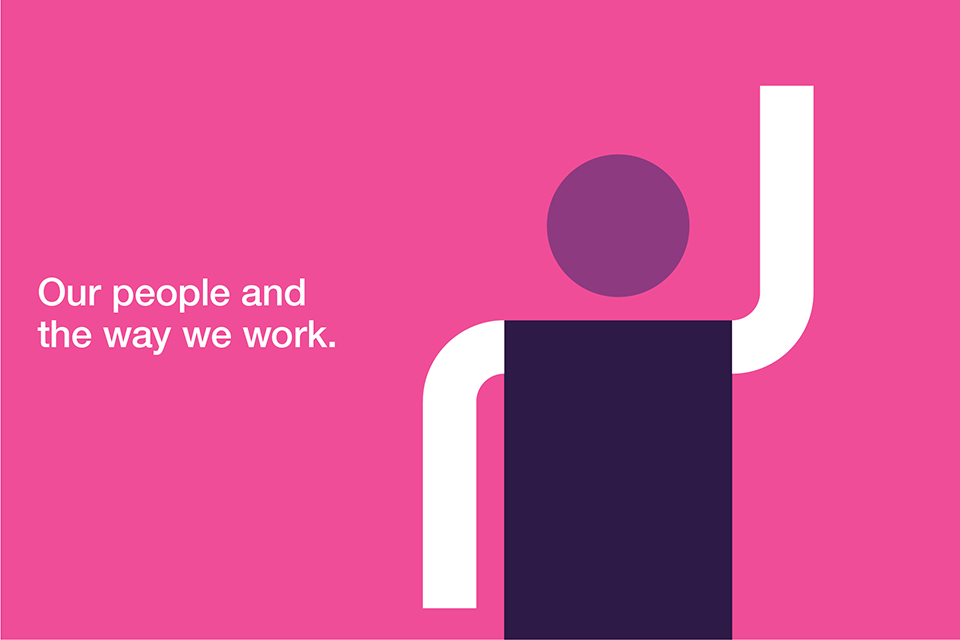
Our goal related to our people and the way we work is that:
Our culture enables our brilliant people to flourish and drives high performance.
Our activities in this area are co-ordinated towards becoming the transformed organisation we aspire to be in terms not only of our people, but also how we are structured and the physical and virtual environments we work in. Over the next year we will progress in all of these areas:
Our people
Leadership and development programmes
In 2020 we plan to initiate programmes and training which will invest in our people to help them be the best they can be and to shape them over the coming months to be the leaders and team members we need in the future, with the right skills and the right mindset.
Staff throughout Companies House at all levels from aspiring managers to our senior leaders will be able to benefit from an exciting range of training interventions delivered over the coming years. This will include delivering leadership essentials training for all line managers and the launch of a tailored 3 year senior leadership development programme. We will also be enhancing our internal capabilities by aligning more closely to government professions so that we can benefit from the best practices and standards that these have to offer.
These things together will equip our managers and leaders with the tools, skills and confidence to thrive and to drive forward our ambitious change programme. We will maintain a focus on evaluation and assessment of impact on performance.
Our original plans for this work have been delayed due to COVID-19, so we have continued to deliver a range of leadership development speakers and activities whilst we review leadership development needs and work on putting these programmes in place in our new world. We are actively assessing opportunities for virtual or adapted delivery and programmes and what this will require in terms of design, as well as exploring additional content to support new and emerging leadership needs.
Organisational development: our service model
Having explored the best way for Companies House to be set up and organised we concluded that a service delivery model would be best for us and our customers. This year will see a major change as, after intense planning, we move further towards that new organisational structure. The importance of this change cannot be underestimated in terms of our transformation and fulfilling our role. We look to our new structure to enable us to scale and flex in the future, increasing our agility and ability to respond to change.
In the future our organisation will be structured around the 3 main services we offer: a filing service, a get company information service and an intelligence and enforcement service. Three Service Owners have been appointed and key building blocks are in place for an interim model. This financial year design and development work will continue as an iterative process towards implementation of the full Companies House new Future Operating Model.
The right people in the right place at the right time
During the year we will carry out a targeted skills gap audit and analysis. We will investigate, and plan to address any gaps in the skills areas that will be vital to our transformation and our future organisation, including implementation of our new service model and our changing role in government. These areas include digital literacy, analysis, and commercial skills; all of which will be fundamental to fulfilling our future role.
To ensure we make the best use of our capacity and capability we will further develop our workforce planning to link to resourcing. We will identify critical posts to underpin work on succession planning and wider talent management. Here we will in the first instance focus on critical posts single points of failure and over time will develop a talent pipeline for all key roles.
To complement this we have created a dedicated centre of expertise for recruitment, underpinned by developing a resourcing and attraction strategy that will focus on our brand, consistent messaging and candidate management. Time to hire will reduce as we improve the recruitment process, supported by proactive advice and guidance for recruiting managers to enable us to secure the right people at the right time.
Reward & recognition
We will develop new approaches to recognition with an emphasis on team performance and promoting the entire benefits package to our colleagues and potential applicants to support recruitment, retention and engagement.
Performance management
We have reviewed how we manage performance, researching what other organisations in both the private and public sector are doing, looking at academic thinking and current ideas around performance, and engaging with staff. Recognising that managing performance falls out of having regular honest conversation, from April 2020 we will be embedding a culture of conversation.
This will mean staff and their managers having regular checks ins to address issues in real time according to a structure they have agreed, with an emphasis on people owning and driving their own development. They will set goals that account for and recognise all work-based activity, to be achieved both individually and as teams.
This will allow us to celebrate success in real time. It will also ensure that concerns around performance are raised and discussed as they arise. We will then be able to put the right measures in place so that dips in performance are managed and support provided where needed to prevent issues becoming longer term problems.
Diversity
Our vision is to be a diverse and inclusive organisation. We aspire to match the diversity of our customers to help us better understand them and their needs, and see diversity as a vital component in widening organisational talent, capability and innovation.
We have over the past year set up a variety of networks to support and understand the needs of underrepresented groups within Companies House. These include LGBTQ+, Ability, Carers’, Family and Women’s networks which have in turn generated more specialised groups. Our FACE (Faith, Allyship, Culture and Ethnicity) network is being launched in September. All of our networks help to increase inclusion and to help all of our people feel that they can bring their whole selves to work. We have also developed a vulnerable persons strategy and pursued a variety of initiatives under the umbrella of Corporate Social Responsibility.
We are addressing the need to increase diversity through our recruitment function with the aim of increasing both applications and appointments from underrepresented groups. The characteristics currently analysed are disability, ethnicity and sexual orientation. Our recruitment activities will target underrepresented groups and we will scope ways of supporting our local communities to have the confidence to apply for civil service jobs. The introduction of smarter ways of working will have a role to play, offering a more attractive working approach outside of fixed pattern legacy working arrangements. We will position Companies House as having all the qualities of an ideal employer with a particular emphasis on our inclusive and welcoming culture, and our commitment to diversity.
Engagement
Our scores in the Civil Service people survey show that our staff are highly engaged and rate Companies House as a great place to work. We will continue to work to enhance all aspects of engagement, with a continued focus on staff understanding our organisational purpose and how their work contributes to delivering it. We will also focus on enhancing employee voice, exploring ways to give our colleagues a voice with a focus on innovation. If we are to maintain our current high levels of engagement and embed our desired behaviours then continuing and enhancing a range of initiatives will be vital: Examples include our Ideas Hub, which gives everyone a chance to have a say, share ideas and help shape our future, as well as programmes around wellbeing, coaching and Corporate Social Responsibility.
Corporate Social Responsibility
Corporate Social Responsibility activity enables Companies House to be a responsible business, and we see that activity as a thread that runs through everything we do.
Opportunities for volunteering as we have known it in the past have been put on hold due to the COVID-19 epidemic. These have included activities under a number of headings - Environmental: working outdoors on rivers, farm days and litter picks. Inclusive: volunteering for and promoting charitable causes such as cancer, mental health support and children’s charities; and Innovation: Using staff skills, for instance running IT sessions at a hospice, or attending community centres and schools to give employment help and advice.
Currently we have been able to continue to make some donations of surplus furniture and equipment when safe and appropriate, and will be alert to further opportunities to exercise Corporate Social Responsibility in our new environment.
The way we work
Smarter working
We have been developing aspects of smarter ways of working for some time. To help us to further embed smart working and increase our maturity in this area we will be aligning to government best practice for smart working using as a basis the PAS3000 framework, the government code of practice on smart working. We will be reviewing and updating our technology, estates and policy to support our cultural change to embedding modern smart working.
The challenges of smart working relate in many ways to culture rather than to technology. The cultural change we aspire to covers a number of aspects including moving to measurement by outcomes and outputs rather than by presence, and fostering a culture of communication and trust, breaking the chain of command and control. We will also encourage people to recognise that work is a thing you do rather than a place you go.
The fact that our work in this area was already advanced at the start of the pandemic meant that we were able to pivot to roll out equipment and adapt systems to rapidly enable the vast majority of staff to work from home. At the same time the cultural changes already underway gave people to tools to adapt and to share experience of new ways of working. Having moved at a far faster rate than originally anticipated we will in the coming months strive to ensure that we retain all the positive aspects of working in the last few months, embedding these into our future planning and building on the new foundations they have provided.
To achieve this we will link to the rollout of our leadership and management development programme and work with leaders to clearly articulate the future state. We will move away from global prescriptive working policies to guidance to support a culture of conversation. Managers will work openly with teams to define business need and ensure team charters are in place to support the delivery approach.
Recognising that the key challenges are cultural does not diminish the fact that there are also some remaining technology challenges. We will continue to work to remove technology barriers that limit the scope for distributed working, including enabling legacy services whilst they still exist so that they can be integrated further into smarter ways of working. Our previous work in this area gave us the tools to move at pace in response to the pandemic, quickly enabling the vast majority of our people to work from home. We will ensure we retain the many positives that have emerged, building good practices and further enhancing technology to make it possible for our people to collaborate effectively and efficiently from anywhere.
Change management
Successful implementation of change is always important and will become increasingly vital for our transformation. Conscious of the wealth of change that will be needed for our transformation and to accommodate future legislative change, enhancing and professionalising our change management capabilities is a priority.
We will therefore be investing in change readiness training and developing a dedicated business change function and capability. This will include determining and investing in the range of tools and support needed to land change effectively in Companies House. We will establish a small corporate change management function, resourced with experienced and skilled professionals using appropriate change management tools and techniques to support our portfolio. We will also carry out specialist change management training with accreditation for a cohort of change agents. At the same time we will raise awareness and provide tailored training to raise the overall capability for dealing with change amongst our leaders, and provide appropriate support to all staff in terms of resilience and impact of change.
7. Our finances and resources

Our goal related to finances and resources is that:
We deliver value through efficient use of resources.
The biggest source of change for us this year is that on 1 April 2020 Companies House changed status from being a trading fund to being part of central government, continuing to operate as an Executive Agency within BEIS. We know that the impact of this change will be substantial, especially in relation to running our financial operations. Whilst we have spent considerable time and effort preparing for this change, there will be an adjustment period for us in how we manage and allocate resources.
Our changed status will bring new requirements and reporting obligations in terms of our financial management and reporting, and add more layers of scrutiny. We will have to change how we operate: Effective governance, management information, and workforce and workload planning will continue to be vital to us and will help us to operate effectively and efficiently according to our new status.
Workforce planning
We will enhance our workforce planning capability to ensure we make the best use of available funding, successfully managing expenditure within our budgetary limits. By understanding demands on our workforce and the skills and capabilities they need we will be able to deliver efficiencies and to reduce use of contractors to fill vacancies.
We will also continue to build our reputation as a digital employer, enabling us to reduce reliance on contractors in that area.
Value
The Government Finance Function requires its finance teams across government to lead on embedding the Public Value Framework within their organisations. To this end, we will conduct a maturity assessment against the framework criteria to understand our current position, and then prioritise a programme of work to enable us to ensure value for money and best support our BEIS as our parent department.
Efficiency
We have operated a corporate efficiency programme for many years, and in 2020 to 2021 we will review the measurement criteria and what is included. Our planned efficiency target for this year is to reduce our budget from BEIS compared to the 2019-2020 baseline.
We expect to achieve this target with sustainable savings from:
- moving to cloud-based IT resources and costs, aligning cost with demand
- use of expert resource to inform innovations e.g. identification, verification and validation
- reduced project capital costs through externally guided experience and updated governance
- terminating significant end of life legacy assets
- negotiating contracts so as to reduce intermediary costs
We will significantly improve our internal financial and commercial systems to support the modernisation of our existing processes. This will benefit our customers and stakeholders through improved services, our staff by giving them better systems to use, and give us an increased ability to drive business performance.
As part of planning for the work we need to undertake to transform our organisation we will be robustly planning what we will buy and when, to ensure we maximise value for money. During the year we expect to award or renew around 70 commercial arrangements. These will include the mobilisation and launch of a new debt collection services contract and all requirements will be compliant with PCR 2015. We will also continue to support the development of Companies House as a property hub for public service organisations.
Our working environment
Aligned to the Civil Service Vision, we will continue to our brilliant people with modern, innovative, and flexible workspaces that drive collaboration, curiosity and innovation. In support of the Places for Growth Agenda, we are proud to also share the brilliant facilities available at our Cardiff office with our multiple tenants from a range of other government departments and the NHS in Wales. During the last financial year we have made a significant investment to attract additional tenants, including a £1.3 million investment in a state of the art conference facility.
In support of the government’s ‘Places for Growth Agenda’ and our drive to be a government mini-hub of choice, we have to date secured interest from further government departments who are keen to share our brilliant facilities and we have increased our tenant portfolio at the Cardiff office. Our focus this year will be on continuing our collaborative works with the Government Property Agency, to review whether we have scope to accommodate their customers seeking quality accommodation. We are targeting a 20% increase in the number of tenants at our Cardiff location by April 2021.
Our focus in the coming months will be on delivering additional capital investment projects for Companies House, which will include a complete re-design of the Cardiff reception area to create a new modern digitally enabled facility. This will not only provide an improved experience for our customers but also harness opportunities available from emerging technologies and provide additional security enhancements. We will also be refurbishing the onsite restaurant facilities for the benefit of our staff and our tenants, to create a modern environment that enhances wellbeing.
Financial performance
The table below shows our planned performance for 2020 to 2021 and the outlook for the following 2 years. The investment this represents supports the achievement of our strategic goals, enabling us to play a key part in combatting economic crime, to deliver brilliant services to our customers and to transform Companies House.
| 2020/21 | 2021/22 | 2022/23 | |
|---|---|---|---|
| Income | £74.5m | £76.4m | £79.4m |
| Programme non-ringfenced (RDEL) | £77.2m | £80.9m | £83.3m |
| Programme ring-fenced (RDEL) | £5.3m | £5.3m | £6.0m |
| Admin non-ringfenced (RDEL) | 0.0 | 0.0 | 0.0 |
| Deficit | (£8.0m) | (£9.8m) | (£9.9m) |
| Capital (CDEL) | £13.8m | £15.0m | £15.0m |
| LFP Scheme (RDEL) | £6.0m | £6.0m | £6.0m |
Fees
Companies House operates on the basis of cost recovery, seeking to break even taking one year with another. Our fees provide the majority of our income and their levels are linked to the service provided. Our fee setting follows ‘Managing Public Money’ principles alongside wider precedents.
We regularly review our fees to ensure that levels remain appropriate. Where necessary, for example following a change of business process, we adjust our fees to ensure that they continue to reflect the nature of the work involved.
During the year we will therefore review our fees with a view to making any necessary adjustments for the following year. At the same time we are beginning a more fundamental review of our fees model to reflect the changing nature of the organisation and ensure that our model remains fit for purpose into the future.
8. Our environmental activity
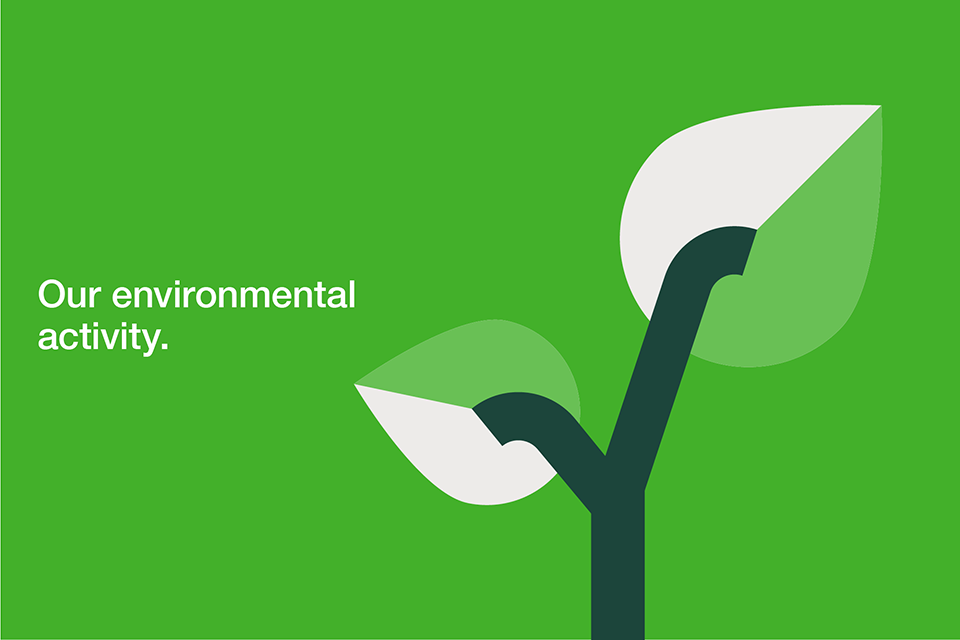
We have already made considerable progress over a number of years in minimising our environmental impact and are keen to do as much as possible to continue this in the future. We work to specific environment targets and plans, monitoring and measuring our environmental performance using our certified ISO14001 Environmental Management System. In this year we will continue to work towards these, as well as pursuing further ways of reducing the environmental impact of our activities. These include the environmental costs of our estate, our supply chain, and our staff’s activities. In addition, our ambition extends beyond our own operations, to giving customers environmentally friendly options for doing business with us.
The environmental impact of customer services
Our services can also help our customers to reduce their environmental impact: Digital services mean less paper and a reduction in environmental costs of transportation and storage, accruing environmental benefits for both our customers and us. Although take-up of our digital filing services is high, there is still a big prize to be gained from achieving higher take-up. Part of our activity this year will therefore be to engage with larger firms still using paper routes to promote the benefits of channel shift to them and their clients, and understand any impediments to their taking advantage of digital routes.
During this year we will reduce paper consumption and transport impact by phasing out our paper reminder service for accounts and confirmation statement filing. Customers will still be able to benefit from reminders by opting in to our digital reminders service but there will be no paper service after the end of the year. This will reduce the number of letters we issue each year by around 4 million and reduce carbon emissions by more than 150 tonnes of carbon dioxide - the equivalent of the annual carbon dioxide emissions of 39 domestic houses. We will also scope the potential and appetite for other digital reminder channels such as SMS. This development signals the way for other services in future years as we will examine other ways in which we can eliminate outbound paper services in favour of digital channels.
Our working environment
Environment targets related to our estate are benchmarked against the previous year. In 2020 to 2021 we will target reductions in consumption, supported by providing specific Building Management System training to our onsite Facilities Management Team.
We have already reduced gas consumption through the installation of a biomass boiler on our Cardiff site, but will aim to reduce it by a further 1%. To do this, we will optimise our Building Management System to improve the efficiency of our gas central heating system.
As we refurbish our reception and restaurant areas we will introduce low carbon technologies. We will also improve suspended ceiling insulation values of the restaurant during the refurbishment. We will replace the uninterruptible power supply system with a more energy efficient model. Together we expect these measures to deliver a further 1% reduction in electricity usage. We will also review technological options and return on investment for solar power.
Our staff have a role to play too, and we will raise awareness of the savings they can contribute in electricity and water usage through campaigns about power switch off and water efficiency.
Mindful of the biodiversity duties that apply to us, during the year we will introduce a new sensory garden designed to aid staff wellbeing, and consider introducing a living wall on parts of the building.
The impact of how we work on the environment
Smarter Working will create an environment that empowers staff to make the right decision about where and when to work; optimising the use of the workplace and technology and realising efficiencies. This will reduce the estates requirement of the organisation, ensuring that we make effective and efficient use of our property estate. Our space will be designed based on the tasks and activities people do rather than a legacy fixed desk setup. This approach will enable a distributed working model, reducing travel and avoiding disruption when access to property is limited. This will reduce organisational risk and enable a safe and effective working model in instances such as the coronavirus pandemic.
Smart, distributed working will reduce carbon footprint through use of modern devices and facilities, as well as reduced paper consumption and printing through digital collaboration and communication. Our continued migration to public cloud hosting and technology provides further efficiencies, public cloud providers are more efficient due to a flexible consumer model of use of technology and power at scale.
Smarter Working also gives us a range of communications methods which cut the need for travel to face to face meetings, reducing both carbon footprint and costs. These reductions will contribute to and be measured as part of our overall environmental objectives.
Our supply chain and the environment
Where we need to procure supplies, services and works to operate our business, we will ensure that they are procured in a way that benefits not only us but also society and the economy whilst minimising damage to the environment. All our procurement will meet the minimum mandatory Government Buying Standards.
We will continue to ensure that we secure value for money and maximise value by effective management of our supply chain. We also ensure through our procurement contracts that our supply chain remains compliant with relevant legislation, including health, safety, quality and environmental requirements.
The environmental contribution of Corporate Social Responsibility
Our volunteering programme will continue to provide opportunities for staff to spend time improving the external environment to Companies House. These opportunities include activities such as litter picks in local communities and pond and stream clearing.
An additional contribution to environmental savings comes from donation of surplus equipment to local charities which both benefits them and prevents the items donated from going to landfill.
9. External accreditations
Environmental standard ISO14001:2015
Companies House has proudly held the ISO:14001 Environmental Standard since 2002. This internationally recognised standard provides a framework, so that Companies House can develop, implement and manage an effective Environmental Management System to responsibly manage our impact on the environment. We are assessed against it annually to ensure the ongoing compliance and deliver continuous improvements. The intended outcomes are clearly defined, and relevant processes and procedures have been put in place to ensure our objectives are met: to protect the environment and reduce pollution; ensure continual improvement by enhancing our environmental performance, and fulfil all relevant environmental compliance obligations.
Health and safety OHSAS 18001:2007
Companies House currently holds certification to the OSHAS:18001 standard which Companies House has held for a number of years. Companies House is working toward attaining the new ISO 45001:2018 standard and has conducted a gap analysis to ensure we meet the criteria of the new, more robust, standard. Its purpose is to provide a framework that will underpin our Occupational Health and Safety Management System, ensuring that comprehensive processes and procedures are in place to reduce workplace risks and create improved and safer working conditions for our employees, customers and visitors.
Customer Service Excellence standard
The government wants organisations to provide excellent services with customers at the heart of its service provision. The Customer Service Excellence Standard was developed to help deliver this. It assesses organisations against the standards, recognises achievements and identifies areas for improvement. Companies House has been successful in achieving the standard with many areas of excellence highlighted. We will have our annual assessment in quarter 3.
Cyber and Information Security
We have, again, maintained certification to the international security standard ISO27001 and compliance with the Payment Card Industry (PCI) standard. This year, we will continue to ensure measured and appropriate security controls, are in place to protect the confidentiality, integrity and availability of our services and data both on premise and in the cloud. This will include ‘secure by design principles’ in our development process.
Official statistics
Companies House has been a producer of official statistics for a number of years. The Office for Statistics Regulation and the UK Statistics Authority have a published Code of Practice. The Code provides producers of official statistics with the detailed practices they must commit to when producing and releasing official statistics. Companies House official statistics are in line with these practices, ensuring that the statistics that we publish serve the public. When producers of official statistics comply with the Code, it gives users of statistics and citizens confidence that published government statistics are of public value, are high quality and are produced by people and organisations that are worthy of trust.
Investors in People
We are proud to be holders of a gold Investors in People award but have an ambition to improve further and achieve platinum accreditation status when we are re-assessed this year. The new process will start in March with an all staff questionnaire supplemented by individual and group interviews with a variety of staff at all levels which we are confident will see us achieve our aim of achieving platinum status.
Mind
We remain focused on our commitment to improving mental health in the workplace. We have undertaken re-assessment this year, receiving a response rate of 55% of our workforce which exceeded our target rate of 46%. Once the results are known we will form a new action plan.
